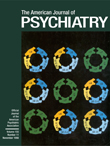To the Editor: Donepezil is a second-generation cholinesterase inhibitor indicated for the treatment of cognitive symptoms of Alzheimer’s disease. Some authors suggest that cholinomimetic treatment may also benefit certain behavioral problems associated with Alzheimer’s disease such as apathy, psychotic symptoms, and agitation
(1). However, another cholinomimetic agent, tacrine, has been associated with behavioral disturbances in some patients with Alzheimer’s disease
(2).
We report on seven patients with Alzheimer’s disease who experienced behavioral worsening following the initiation of donepezil. All were diagnosed with Alzheimer’s disease according to DSM-IV criteria. Their mean age was 76.4 years, and their mean score on the Mini-Mental State examination
(3) was 18.4. Five patients had experienced dementia-related delusions and irritability before donepezil use; one had a history of major depression; and the other, a history of somatization disorder. At the time of donepezil initiation, four were being treated with sertraline, one with paroxetine, one with venlafaxine, and four with risperidone. All began a regimen of donepezil, 5mg/day. After 4–6 weeks, the dose of five patients was increased to 10 mg/day of donepezil. In the other two cases, donepezil was discontinued after 5 weeks, in one case because of gastrointestinal symptoms and in the other because of increasing agitation. After an average of 7.3 weeks (range: 1–13 weeks) following initiation of donepezil, all seven patients experienced a recurrence of previous behavioral problems. Five became more agitated, one became depressed, and the patient with somatization disorder became more anxious and somatically preoccupied. An additional case (not evaluated by us) came to our attention: a demented nursing home patient, after starting donepezil, resumed playing the piano but also resumed trying to leave the nursing home, a behavior that had resolved as her dementia progressed.
This return of behavioral disturbances is particularly noteworthy in light of the commonly heard expectation that donepezil, like tacrine, may improve cognition by “turning back the clock” by approximately 6–12 months in patients with Alzheimer’s disease. However, turning back the clock in Alzheimer’s patients with behavioral disturbances may not, in fact, be a desirable outcome, since behavioral problems seen earlier may return. Alternatively, donepezil may improve apathy related to Alzheimer’s disease, giving patients more energy and initiative to resume their disruptive behavior. Finally, it is possible that the behavioral symptoms we observed were the result of a drug-drug interaction. However, donepezil is not known to be a potent enzyme inhibitor and is metabolized by means of both the CYP 2D6 and 3A4 hepatic microsomal enzyme systems, making such interactions less likely. Also, a similar pattern of behavioral changes (e.g., regression to an earlier behavioral problem) was seen regardless of the particular agent used in conjunction with donepezil, suggesting that this effect is unlikely to be related to a pharmacokinetic interaction.

